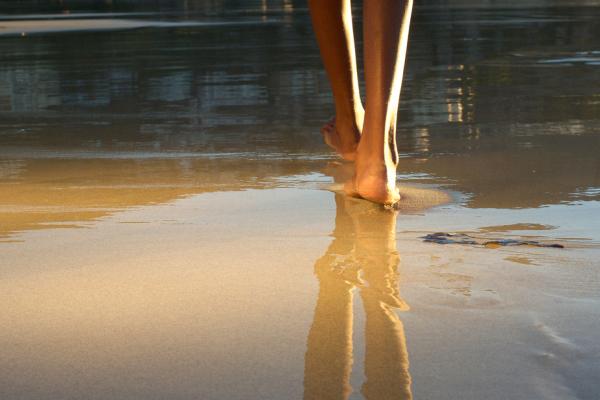It is Holy Week. And I must admit I’m challenged by it. I’m the kind of person who is much more comfortable in my mind, in words on pages, and in thoughts strung together. I am much more comfortable there than in my body, in my own feet stepping down the street, in my own hips, thighs, calves, swaying arms cutting air, swinging, bobbing, Reebok-ing anywhere.
This wasn’t always the case.
There was a stint in high school, and again in college, and again in grad school, and again in the other grad school when I believed in my body’s capacity to excel — and so it did. I sailed around that high school track multiple times without stopping! I dove for the ball in the students v. teachers volley ball tournament, and I danced: jazz, tap, ballet! In college I rode my bike everywhere. In grad school I did interval training and in the other grad school I did power-walking — and Jenny Craig.
Mind you, all of these periods came in short bursts that propelled me forward for a time and then I would slow down, go into myself, and come out again with another burst in a year or two.
But my last big burst was about eight years ago. I haven’t swayed anything or bobbed anywhere for any significant amount of time since.
I felt it coming on. I knew it was happening when it was happening, but I had no idea I would become consumed by it.
“I just don’t feel like getting up to go walking,” I’d tell myself at my normal walking time.
“What if today is the day I get jumped and raped in the park?”
So I stayed home, convinced I was safer in my bed. Then I moved to a city I didn’t know and the rationalizations took deeper root.
And so, for eight years I have lived like a dualistic gnostic — pushing myself toward spiritual renewal while allowing my body to grow stagnant, stiff, and bloated.
What triggered it? I’ve asked myself that question many times over the years.
A recent event in my life crystalized it for me: Loss had stifled me. A loss locked my feet and knees and would not let me move forward. This loss was loss of hope.
Most of us have that area of our lives where we struggle to hope. For me it is that space down deep where I hide the dream of a family: a loving husband and laughing children and a rockin’ writing and speaking schedule — yeah! It’s my dream.
Read the Full Article

